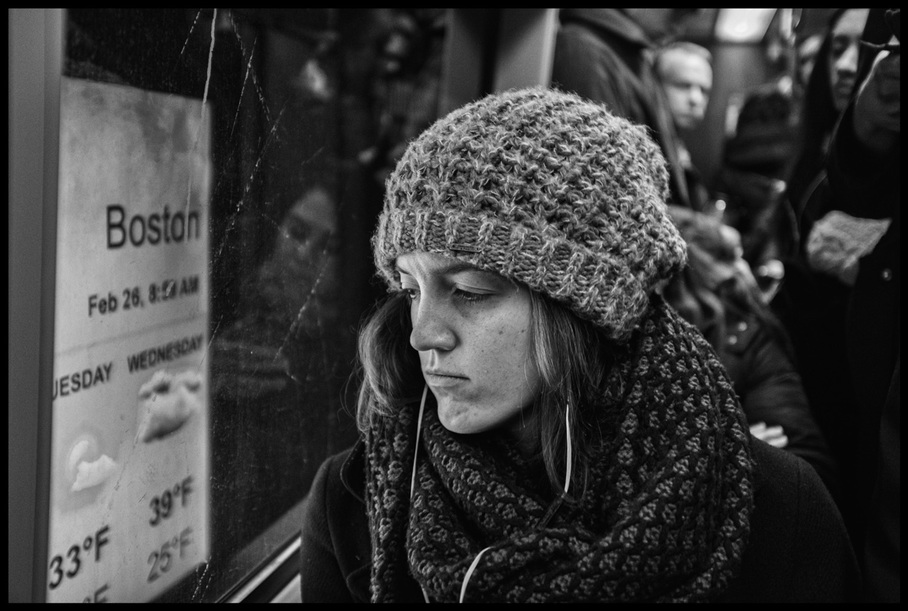
Alone, Together - Beneath the streets of Boston
B. D. Colen | Massachusetts, United States
Photographer: B. D. Colen
Exhibit Title: Alone, Together - Beneath the streets of Boston
Location: Massachusetts, United States
Thomas Wolfe, the 20th century writer who warned us that we "can't go home again," wrote at one point in his sadly short existence that "the whole conviction of (his) life now rests upon the belief that loneliness, far from being a rare and curious phenomenon, is the central and inevitable fact of human existence.”
The reality of Wolf's observation ironically may be best observed in the midst of a crowd, for nowhere do individuals often seem more isolated, seem to appear more lonely than they do when surrounded by their fellow human beings.
For the past decade I have been documenting this phenomenon in the subway cars of the Massachusetts Bay Transit Authority - the MBTA’s Green and Red Lines, where every day tens of thousands of riders, of all ages, races, and social strata, are packed in, Alone, Together.
Here is a Boston Magazine article about this work and interview with me.
Thomas Wolfe, the 20th century writer who warned us that we "can't go home again," wrote at one point in his sadly short existence that "the whole conviction of (his) life now rests upon the belief that loneliness, far from being a rare and curious phenomenon, is the central and inevitable fact of human existence.”
The reality of Wolf's observation ironically may be best observed in the midst of a crowd, for nowhere do individuals often seem more isolated, seem to appear more lonely than they do when surrounded by their fellow human beings.
For the past decade I have been documenting this phenomenon in the subway cars of the Massachusetts Bay Transit Authority - the MBTA’s Green and Red Lines, where every day tens of thousands of riders, of all ages, races, and social strata, are packed in, Alone, Together.
When I began photographing on the subway, I had no preconceptions; I simply wanted to make compelling images. Yet the longer I've photographed my fellow "T" riders, the more the concept of isolation in a crowd has taken over the work. Individually, in twos and threes, and even in larger groups, those crammed into often distressingly close proximity to complete strangers seem unaware of the presence of others.
Some of this undoubtedly has to do with the wearing of headphones, the focus on reading materials, or simply the need to doze at the too-early beginning, or late ending of a demanding day. I have to wonder, however, whether absorption in books, with iDevices, newspapers, or napping, isolates individuals unintentionally, or are these points of focus walls behind which people quite knowingly barricade themselves?
Perhaps the answer to this chicken and egg conundrum may be found in the behavior of couples, who though they have connectedness, are in that connectedness as isolated as any individual, seemingly oblivious to those around them who can watch what they are doing, hear what they are saying, and marvel at the egocentricity of it all.
Almost everyone to whom I have previously shown parts of this project has asked whether people object to my photographing them, has asked whether I request permission to make these strangers my subjects. And always I say that they don't, and neither do I. For to object, they would have to acknowledge my presence - beyond looking in my direction - and for me to ask, I would have to engage with them. And then neither they nor I would be Alone, Together.
----------
Go to WGBH - Boston's Public Radio, to hear me talking about this exhibit:
B. D. Colen
Email - bd@bdcolenphoto.com
Web - www.bdcolenphoto.com
Tumblr - bdcolen.tumblr.com
Twitter - @TheBDColen
Cell - 627-413-1224
B. D. Colen is a Pulitzer Prize-winning former reporter, editor, and columnist who spent 26 years at The Washington Post and Newsday, covering medicine, health care, and health policy for 17 of those years. A photographer for more than 50 years, Colen began his professional photography career in 1963, covering the historic March on Washington for Jobs and Freedom for a weekly newspaper in Connecticut.
For the past 14 years Colen has taught documentary photography and journalism writing courses at The Massachusetts Institute of Technology (MIT), and has taught photography at the Maine Media Workshops and the Harvard University Extension School.
Colen's work has appeared in publications from Newsday, to the New England Journal of Medicine, from the Boston Globe, to the Christian Science Monitor, from WBUR, to The Huffington Post. He has photographed for numerous corporate and institutional clients and he occasionally blogs on Huffington Post.
B. D. Colen is available for international and national documentary work for NGOs, and has done work in the developing world for Midwives For Haiti, Project Medishare, Chances 4 Children, CODE Canada, the International Book Bank, and the Alliance For Children Foundation. Colen also does work for editorial clients and private individuals and families.
Make Comment/View Comments